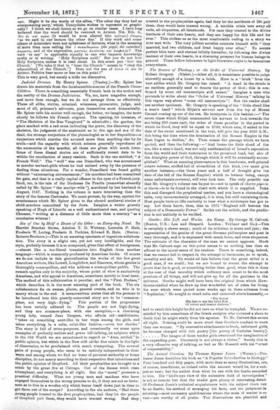The Scrence of Theology ; or the Order of Universal
I! eatery. By Robert Gregory. (Nisbet.)—After all, it is sometimes possible to judge shrewdly enough of a house by a brick. Here is a " brick " from the vast edifice which Mr. Gregory has raised. 'A hand in the clouds is an emblem generally used to denote the power of God ; this is con- firmed by some old manuscripts still extant." Imagine a man who pretends to write about the "Order of Universal History " talking in this vague way about "some old manuscripts "! But the reader shall see another specimen. Mr. Gregory is speaking of the " little cloud like a man's hand" which Elijah's servant saw from the top of Mount Carmel coming up out of the sea. He interprets in this fashion :—" The seven times which Elijah commanded his servant to look towards the sea being 390 years each, the order of times peculiar to the period in which he lived, they will be equal to 2730, which sum, if added to the date of the event mentioned in the text, will give the year 5630 A.M., this being the time when the domination of the Roman Empire in the East began to decline," &c. Then comes the passage which we have quoted, and then the following :—" And hence the little cloud of the sea, like a man's hand, was not only emblematical of Israel's separation from the world and their restoration to the promised land, but also of the Almighty power of God, through which it will be eventually accom- plished." What an amazing phenomenon is this handsome, well-printed octavo volume, stuffed full of absurdities of this kind, (we must give another instance,—the three years and a half of drought give the date of the fall of the Roman Empire) which no human being, except some unfortunate reviewer, will ever look into. The only possible use that Mr. Gregory's volume can be put to—not to speak of chartte piperis et thuris—is to be found in the chart with which it is supplied. Take this and disregard the prophetical matter, and you have a chronological table, very inconveniently arranged, it is true, but still containing facts. Most people have an idle curiosity to hear what a soothsayer has got to say. Lot them know, then, that iu 1875 "England will become the subject of a Democratic Power." Strike out the article, and the predic- tion is not unlikely to be verified.


































 Previous page
Previous page